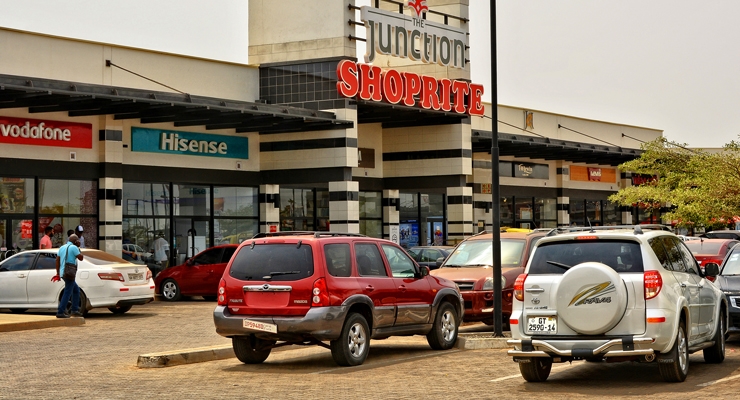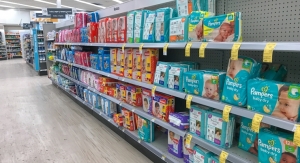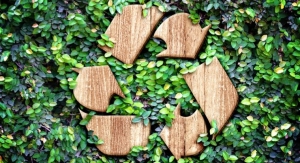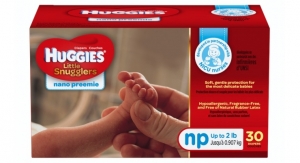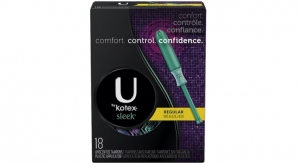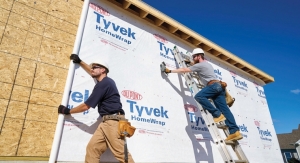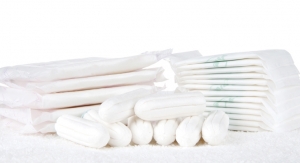Raymond Chimhandamba, Handas Consulting04.05.19
South Africa
According to Euromonitor International’s 2018 Wipes Report, value sales for wipes increased by 10% in 2017 to reach ZAR749 million or US$55 million in South Africa. Leading brands continued with aggressive promotional activities to gain market share. Of this value, homecare wipes and floor cleaning systems represented ZAR3 million or US$214,000 in sales, which increased by 5% in 2017. Average unit prices are also moving upwards.
In baby wipes, private label offerings are on the rise, and Johnson & Johnson leads the category with a 27% value share. More and more private label products are appearing alongside leading brands on shelves, especially in the top retailers such as Pick ‘n Pay and pharmacies such as Clicks.
Private label brands are placed strategically next to leading brands as a way to increase sales. Pampers wipes are placed next to the company’s diapers, as a way to encourage impulse purchases. Consumers’ demand for convenience as well as targeted, solution-orientated goods has continued to increase the sales for wipes in 2017.
Euromonitor International comments that baby wipes are being used for more than just babies. They are used on babies, toddlers, children as well as adults. They are used for facial cleansing and refreshing, removing make-up and as travel wipes. Baby wipes vary significantly and differentiation is difficult. For that reason, Pampers wipes introduced a “refresh refill” pack. It comes in a pack of 64 with a clip lid to keep the wipes moist and fresh. Cherub’s has also followed the same strategy.
Baby wipes are proving to be a highly profitable category as there is a wide range of products to choose from. Leading brands offer a good range of pack sizes, side by side with private label options that tend to target consumers with more limited budgets. Pick ‘n Pay private label costs ZAR47,99 for a pack of 160, while Clicks charges ZAR15,95 for aloe vera scented wipes and the more premium Pampers costs ZAR55,99 for a pack of 128 wipes.
Huggies introduced new Huggies Pure wipes that claim to offer pure, gentle cleaning like cotton wool and water. They are priced at ZAR29,90 for a pack of 64. Differentiation is difficult within baby wipes, but trust and quality are key considerations for consumers, followed by price as consumers continue to demand value offerings.
In terms of the competitive landscape, the most lucrative categories in personal wipes are baby wipes and facial cleaning wipes. In the baby wipes category, again, private label products along with leading brands such as Pampers and Johnson’s Baby Skincare had significant value shares. Huggies wipes are also increasing their market share, as well as local brands Bumbies, which was recently acquired by Twinsaver Group.
Johnson & Johnson leads in facial cleansing wipes closely followed by private label, which has been showing continued growth. One can assume that the price attractiveness of private label has been the biggest driver of this growth. Beiersdorf’s Nivea products also command a strong share. These products are more widely available from supermarkets, as they lead channel sales, followed by health and beauty specialist retailers.
Clicks is one of South Africa’s leading pharmacy chains. Clicks exclusive baby club maximizes category opportunities with cards that offer various specials and deals for pregnant women or women with children up to the age of three. Baby Club scheme offers a number of baby products on special offer to mothers who belong to the scheme.
Other wipes categories also recorded positive growth. Home care wipes and floor cleaning systems also recorded positive growth for the year, with all-purpose cleaning wipes showing the most encouraging growth. Private label products from Pick n Pay are especially visible in all-purpose cleaning wipes, because it had a variety of pack sizes ranging in price. For personal wipes, strong growth was realized in all categories. The strongest growth was recorded in general purpose wipes. Intimate wipes also recorded high growth, although from a small base. The same applies to moist toilet wipes as this category is extremely small and niche in South Africa.
Wipes in Nigeria
According to Euromonitor International’s 2018 Wipes Report for the Nigeria market, “The growing population and rising disposable incomes ensure growth. The wipes category is expected to increase in volume terms and value terms at constant 2017 prices over the forecast period, due to the growing population and the desire for better hygiene as a result of growth in employment and improved standards of living in the country, particularly in urban areas.” In addition, baby wipes is expected to increase the demand in wipes as a result of an increase in Nigeria’s baby and child population.
Price competition is expected to bring down unit prices. Local producers such as Wemy Industries are also using lower prices to ward off the threat posed by cheaper imported brands.
Cosmetic wipes are expected to show the fastest volume growth in wipes. The middle and upper-income consumers who are seeking value-added products for their cosmetic needs are helping to drive the volumes for cosmetic wipes. The offering is a novelty and has attracted the interest of this consumer.
The local wipes manufacturer, Wemy Industries leads the wipes category in value terms in 2017, with a 19% value share. “Its Dr Browns and Nightingale brands are very competitive against the premium brands Pampers, Cussons and Huggies.”
Different income groups purchase different products, with premium baby wipes brands being purchased mostly by high-income earners, while the Dr. Browns and Nightingale brands of baby wipes from Wemy Industries, which are a standard offering, are demanded by both middle and low-income earners. “Wemy Industries’s baby wipes lead compared with other brands, particularly premium brands, because of their good prices and their high quality.” Discussions with an executive from Wemy Industries reveals that they are unable to keep up with demand. He says, “We currently sell everything that we make and we are unable to keep up with demand. In fact we are having to turn away other toll manufacturing opportunities because we just don’t have the capacity.”
The diaper market leader, Hayat Kimya Nigeria, is also expected to manufacture wipes as complementary products for its brands of nappies/diapers in the future, just like Wemy Industries, Procter & Gamble and Kimberly-Clark, but at the moment all their wipes are imported. As a result the price is not competitive and they have not been able to achieve the same success in this category as they have done with diapers. Competition is therefore expected to increase in the future, just as has been seen in nappies/diapers/pants, in which Hayat Kimya has gained a strong share in a short period of time.
Wipes in Algeria
Euromonitor International indicates that, “The demand for wipes in Algeria is expected to continue seeing strong growth over the forecast period, fuelled by several global drivers. Key among these are convenience, hygiene, performance, ease of use, time savings, disposability, safety/regulation and consumer-perceived aesthetics.”
Baby wipes continue to dominate the wipes category and is expected to remain the dominant product area within wipes for the foreseeable future. “Baby wipes will continue to have the widest distribution, being viewed by many as offering a practical and hygienic solution for cleaning babies.”
Wipes are expected to see a gradual slowdown in growth, year on year, as the category is starting to approach maturity among the main consumers in urban centers.
The wipes category is led by domestic manufacturer Hygienix sarl which consolidated its value share in 2017. “The company benefits from high recognition of its leading brands, Mio Bébé, Pam Pam and Bébé Soft, which posted sustainable value growth in 2017.”
Local manufacturers, which have improved their product quality, continued to gain share from international companies and have performed strongly in the wipes category in 2017. Local companies also benefited from declining consumer purchasing power as they maintained affordable prices compared to imported international brands.
Owing to a more challenging economic environment, wipes manufacturers that offer premium products face headwinds with their positioning and also have pricing challenges to contend with. The Algerian economy has not been performing well due to falling global oil prices, which have negatively impacted government oil revenues. As a result, economy brands have thrived in 2017.
Wipes in Morocco
“Baby wipes remained the largest category within wipes in Morocco in 2017, and this is expected to continue,” according to Euromonitor International’s 2018 report. Consumers buy baby wipes to ensure children’s wellbeing and to save time.
“Moroccan households are shifting from cloth alternatives towards packaged wipes.” This trend is also strengthened by the fact that many women in Morocco joined the workforce in the last decade, “and thus have more money to spend on wipes to keep themselves and their children clean and comfortable.”
Although the birth rate is declining in Morocco, wipes are considered a necessity for babies. Advertising is strong across various media channels.
Johnson & Johnson Maroc continued to lead the wipes category in 2017. “The strong position of the company is thanks to its widely recognized brands Carefree in intimate wipes, Johnson’s Baby in baby wipes and Johnson & Johnson in facial cleansing wipes.”
The culture of using wipes is still not very prevalent in Morocco, but it is growing. In addition, many local companies still operate only as local partners to international companies.
General purpose cleaning wipes and baby wipes performed strongly in value growth in Morocco in 2017. The majority of manufacturers compete aggressively in these two categories.
Wipes in Egypt
Euromonitor International says that baby wipes was the only category in 2017 to post a heavy current value decline, caused mainly by strong promotional activities in the category.
General purpose wipes posted a modest volume growth. “Egyptian consumers are slowly becoming accustomed to using general purpose wipes. As imported wipes such as Dettol have become more expensive, they are opting for domestic brands such as Easy Care and Maxi Touch, which are produced locally by Easy Group For Health & Beauty Care and KANDEEL Industry & Trade, respectively, and which both offer cheaper prices and reasonable quality.”
“Unlike in Europe, moist toilet wipes are largely absent from the Egyptian market. This is mainly because many toilets in the country have built-in water sprays.”
Easy Group for Health & Beauty Care continued to lead the wipes category with its Easy Care brand in 2017. This is mainly because it offers better prices than the competing imported brands.
The consumers prefer local brands such as Easy Care and Maxi Touch, thanks to their cheaper prices but still reasonable quality. Furthermore, local brands such as these are widely available in pharmacies and supermarkets, the key channels for the category.
“Reckitt Benckiser offers the well-known Dettol brand of wipes in Egypt. Dettol was the leading brand in general purpose wipes up to 2016 but following devaluation of the Egyptian pound in November of that year its price soared, along with that of many other imported goods.” As a result, they have since lost market share in the general purpose wipes.
Wipes in Kenya
Euromonitor’s says that demand for wipes in Kenya has been driven by the surge in the number of beauty bars in modern retailing stores, offering customers trial sessions. “This is due to the expansion of international brands such as Clinique, Lancôme and Mac, as well as local brands such as Suzie Beauty, which are trying to capture middle-class consumers who spend a large portion of their time shopping in shopping centers.”
Millennials have a preference for wipes versus hand sanitizers. They are not willing to pay a premium price for pocket wet wipes. The trend for carrying wipes is gaining momentum as this group is always on the go and realizes the need for hygiene. As a result, small packs of wipes, which are easy to carry around, are more popular and are being preferred to hand sanitizer.
Owing to the fact that babies have mild skin, Huggies and Pampers ensure that the wipes manufactured under their brand names are produced using safe and healthy resources and that the products undergo strict quality controls. In addition, mothers are aware of the health impact that chemicals have on their babies, and therefore require full disclosure from manufacturers regarding what is included in the manufacturing of their products.
Consumers have a high preference for brands such as Pampers due to their extensive marketing, which has generated a strong consumer following. “Furthermore, Pampers for example, is perceived as able to leverage its scale and expertise, research and development capabilities, and strong brand equity to provide high-quality and innovative personal-care products.”
Rising income levels are creating higher disposable incomes and have led to an urbanized, well-connected middle-class consumer who is more willing to try out new products. This consumer‘s changing consumption patterns and attitudes towards new products, as compared with other income groups, has in turn led to increased competition among manufacturers, as they try come up with innovative products that capture this consumer’s attention, but still offer affordable prices.
There has been an intense environmental debate that wipes are not biodegradable and are therefore harmful to the environment. “With brands appealing to millennial consumers who are well connected and demanding products with sustainability, manufacturers are looking into using cotton wool as a cheaper and safer cleaning method for many households.”
Wipes in Cameroon
According to Euromonitor Wipes report for Cameroon, retail value sales for wipes category in Cameroon in 2017 grew by 15% to reach XAF500 million. Local manufacturers increased their presence in personal wipes and as a result the category saw a strong retail current value sales growth. High prices constrained home care wipes and floor cleaning systems. Unit prices for baby wipes also rose in 2017.
Beiersdorf led the category in 2017 with a 24% retail value share. “Demand for wipes grew in line with nappy/diaper usage.” Economy and standard products recorded higher volume sales versus premium offerings. There is a growing environmental awareness that is likely to affect sales in the future. International manufacturers dominate the wipes category.
New product developments will maintain the consumer’s interest in this market.
According to Euromonitor International’s 2018 Wipes Report, value sales for wipes increased by 10% in 2017 to reach ZAR749 million or US$55 million in South Africa. Leading brands continued with aggressive promotional activities to gain market share. Of this value, homecare wipes and floor cleaning systems represented ZAR3 million or US$214,000 in sales, which increased by 5% in 2017. Average unit prices are also moving upwards.
In baby wipes, private label offerings are on the rise, and Johnson & Johnson leads the category with a 27% value share. More and more private label products are appearing alongside leading brands on shelves, especially in the top retailers such as Pick ‘n Pay and pharmacies such as Clicks.
Private label brands are placed strategically next to leading brands as a way to increase sales. Pampers wipes are placed next to the company’s diapers, as a way to encourage impulse purchases. Consumers’ demand for convenience as well as targeted, solution-orientated goods has continued to increase the sales for wipes in 2017.
Euromonitor International comments that baby wipes are being used for more than just babies. They are used on babies, toddlers, children as well as adults. They are used for facial cleansing and refreshing, removing make-up and as travel wipes. Baby wipes vary significantly and differentiation is difficult. For that reason, Pampers wipes introduced a “refresh refill” pack. It comes in a pack of 64 with a clip lid to keep the wipes moist and fresh. Cherub’s has also followed the same strategy.
Baby wipes are proving to be a highly profitable category as there is a wide range of products to choose from. Leading brands offer a good range of pack sizes, side by side with private label options that tend to target consumers with more limited budgets. Pick ‘n Pay private label costs ZAR47,99 for a pack of 160, while Clicks charges ZAR15,95 for aloe vera scented wipes and the more premium Pampers costs ZAR55,99 for a pack of 128 wipes.
Huggies introduced new Huggies Pure wipes that claim to offer pure, gentle cleaning like cotton wool and water. They are priced at ZAR29,90 for a pack of 64. Differentiation is difficult within baby wipes, but trust and quality are key considerations for consumers, followed by price as consumers continue to demand value offerings.
In terms of the competitive landscape, the most lucrative categories in personal wipes are baby wipes and facial cleaning wipes. In the baby wipes category, again, private label products along with leading brands such as Pampers and Johnson’s Baby Skincare had significant value shares. Huggies wipes are also increasing their market share, as well as local brands Bumbies, which was recently acquired by Twinsaver Group.
Johnson & Johnson leads in facial cleansing wipes closely followed by private label, which has been showing continued growth. One can assume that the price attractiveness of private label has been the biggest driver of this growth. Beiersdorf’s Nivea products also command a strong share. These products are more widely available from supermarkets, as they lead channel sales, followed by health and beauty specialist retailers.
Clicks is one of South Africa’s leading pharmacy chains. Clicks exclusive baby club maximizes category opportunities with cards that offer various specials and deals for pregnant women or women with children up to the age of three. Baby Club scheme offers a number of baby products on special offer to mothers who belong to the scheme.
Other wipes categories also recorded positive growth. Home care wipes and floor cleaning systems also recorded positive growth for the year, with all-purpose cleaning wipes showing the most encouraging growth. Private label products from Pick n Pay are especially visible in all-purpose cleaning wipes, because it had a variety of pack sizes ranging in price. For personal wipes, strong growth was realized in all categories. The strongest growth was recorded in general purpose wipes. Intimate wipes also recorded high growth, although from a small base. The same applies to moist toilet wipes as this category is extremely small and niche in South Africa.
Wipes in Nigeria
According to Euromonitor International’s 2018 Wipes Report for the Nigeria market, “The growing population and rising disposable incomes ensure growth. The wipes category is expected to increase in volume terms and value terms at constant 2017 prices over the forecast period, due to the growing population and the desire for better hygiene as a result of growth in employment and improved standards of living in the country, particularly in urban areas.” In addition, baby wipes is expected to increase the demand in wipes as a result of an increase in Nigeria’s baby and child population.
Price competition is expected to bring down unit prices. Local producers such as Wemy Industries are also using lower prices to ward off the threat posed by cheaper imported brands.
Cosmetic wipes are expected to show the fastest volume growth in wipes. The middle and upper-income consumers who are seeking value-added products for their cosmetic needs are helping to drive the volumes for cosmetic wipes. The offering is a novelty and has attracted the interest of this consumer.
The local wipes manufacturer, Wemy Industries leads the wipes category in value terms in 2017, with a 19% value share. “Its Dr Browns and Nightingale brands are very competitive against the premium brands Pampers, Cussons and Huggies.”
Different income groups purchase different products, with premium baby wipes brands being purchased mostly by high-income earners, while the Dr. Browns and Nightingale brands of baby wipes from Wemy Industries, which are a standard offering, are demanded by both middle and low-income earners. “Wemy Industries’s baby wipes lead compared with other brands, particularly premium brands, because of their good prices and their high quality.” Discussions with an executive from Wemy Industries reveals that they are unable to keep up with demand. He says, “We currently sell everything that we make and we are unable to keep up with demand. In fact we are having to turn away other toll manufacturing opportunities because we just don’t have the capacity.”
The diaper market leader, Hayat Kimya Nigeria, is also expected to manufacture wipes as complementary products for its brands of nappies/diapers in the future, just like Wemy Industries, Procter & Gamble and Kimberly-Clark, but at the moment all their wipes are imported. As a result the price is not competitive and they have not been able to achieve the same success in this category as they have done with diapers. Competition is therefore expected to increase in the future, just as has been seen in nappies/diapers/pants, in which Hayat Kimya has gained a strong share in a short period of time.
Wipes in Algeria
Euromonitor International indicates that, “The demand for wipes in Algeria is expected to continue seeing strong growth over the forecast period, fuelled by several global drivers. Key among these are convenience, hygiene, performance, ease of use, time savings, disposability, safety/regulation and consumer-perceived aesthetics.”
Baby wipes continue to dominate the wipes category and is expected to remain the dominant product area within wipes for the foreseeable future. “Baby wipes will continue to have the widest distribution, being viewed by many as offering a practical and hygienic solution for cleaning babies.”
Wipes are expected to see a gradual slowdown in growth, year on year, as the category is starting to approach maturity among the main consumers in urban centers.
The wipes category is led by domestic manufacturer Hygienix sarl which consolidated its value share in 2017. “The company benefits from high recognition of its leading brands, Mio Bébé, Pam Pam and Bébé Soft, which posted sustainable value growth in 2017.”
Local manufacturers, which have improved their product quality, continued to gain share from international companies and have performed strongly in the wipes category in 2017. Local companies also benefited from declining consumer purchasing power as they maintained affordable prices compared to imported international brands.
Owing to a more challenging economic environment, wipes manufacturers that offer premium products face headwinds with their positioning and also have pricing challenges to contend with. The Algerian economy has not been performing well due to falling global oil prices, which have negatively impacted government oil revenues. As a result, economy brands have thrived in 2017.
Wipes in Morocco
“Baby wipes remained the largest category within wipes in Morocco in 2017, and this is expected to continue,” according to Euromonitor International’s 2018 report. Consumers buy baby wipes to ensure children’s wellbeing and to save time.
“Moroccan households are shifting from cloth alternatives towards packaged wipes.” This trend is also strengthened by the fact that many women in Morocco joined the workforce in the last decade, “and thus have more money to spend on wipes to keep themselves and their children clean and comfortable.”
Although the birth rate is declining in Morocco, wipes are considered a necessity for babies. Advertising is strong across various media channels.
Johnson & Johnson Maroc continued to lead the wipes category in 2017. “The strong position of the company is thanks to its widely recognized brands Carefree in intimate wipes, Johnson’s Baby in baby wipes and Johnson & Johnson in facial cleansing wipes.”
The culture of using wipes is still not very prevalent in Morocco, but it is growing. In addition, many local companies still operate only as local partners to international companies.
General purpose cleaning wipes and baby wipes performed strongly in value growth in Morocco in 2017. The majority of manufacturers compete aggressively in these two categories.
Wipes in Egypt
Euromonitor International says that baby wipes was the only category in 2017 to post a heavy current value decline, caused mainly by strong promotional activities in the category.
General purpose wipes posted a modest volume growth. “Egyptian consumers are slowly becoming accustomed to using general purpose wipes. As imported wipes such as Dettol have become more expensive, they are opting for domestic brands such as Easy Care and Maxi Touch, which are produced locally by Easy Group For Health & Beauty Care and KANDEEL Industry & Trade, respectively, and which both offer cheaper prices and reasonable quality.”
“Unlike in Europe, moist toilet wipes are largely absent from the Egyptian market. This is mainly because many toilets in the country have built-in water sprays.”
Easy Group for Health & Beauty Care continued to lead the wipes category with its Easy Care brand in 2017. This is mainly because it offers better prices than the competing imported brands.
The consumers prefer local brands such as Easy Care and Maxi Touch, thanks to their cheaper prices but still reasonable quality. Furthermore, local brands such as these are widely available in pharmacies and supermarkets, the key channels for the category.
“Reckitt Benckiser offers the well-known Dettol brand of wipes in Egypt. Dettol was the leading brand in general purpose wipes up to 2016 but following devaluation of the Egyptian pound in November of that year its price soared, along with that of many other imported goods.” As a result, they have since lost market share in the general purpose wipes.
Wipes in Kenya
Euromonitor’s says that demand for wipes in Kenya has been driven by the surge in the number of beauty bars in modern retailing stores, offering customers trial sessions. “This is due to the expansion of international brands such as Clinique, Lancôme and Mac, as well as local brands such as Suzie Beauty, which are trying to capture middle-class consumers who spend a large portion of their time shopping in shopping centers.”
Millennials have a preference for wipes versus hand sanitizers. They are not willing to pay a premium price for pocket wet wipes. The trend for carrying wipes is gaining momentum as this group is always on the go and realizes the need for hygiene. As a result, small packs of wipes, which are easy to carry around, are more popular and are being preferred to hand sanitizer.
Owing to the fact that babies have mild skin, Huggies and Pampers ensure that the wipes manufactured under their brand names are produced using safe and healthy resources and that the products undergo strict quality controls. In addition, mothers are aware of the health impact that chemicals have on their babies, and therefore require full disclosure from manufacturers regarding what is included in the manufacturing of their products.
Consumers have a high preference for brands such as Pampers due to their extensive marketing, which has generated a strong consumer following. “Furthermore, Pampers for example, is perceived as able to leverage its scale and expertise, research and development capabilities, and strong brand equity to provide high-quality and innovative personal-care products.”
Rising income levels are creating higher disposable incomes and have led to an urbanized, well-connected middle-class consumer who is more willing to try out new products. This consumer‘s changing consumption patterns and attitudes towards new products, as compared with other income groups, has in turn led to increased competition among manufacturers, as they try come up with innovative products that capture this consumer’s attention, but still offer affordable prices.
There has been an intense environmental debate that wipes are not biodegradable and are therefore harmful to the environment. “With brands appealing to millennial consumers who are well connected and demanding products with sustainability, manufacturers are looking into using cotton wool as a cheaper and safer cleaning method for many households.”
Wipes in Cameroon
According to Euromonitor Wipes report for Cameroon, retail value sales for wipes category in Cameroon in 2017 grew by 15% to reach XAF500 million. Local manufacturers increased their presence in personal wipes and as a result the category saw a strong retail current value sales growth. High prices constrained home care wipes and floor cleaning systems. Unit prices for baby wipes also rose in 2017.
Beiersdorf led the category in 2017 with a 24% retail value share. “Demand for wipes grew in line with nappy/diaper usage.” Economy and standard products recorded higher volume sales versus premium offerings. There is a growing environmental awareness that is likely to affect sales in the future. International manufacturers dominate the wipes category.
New product developments will maintain the consumer’s interest in this market.

